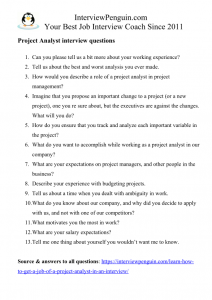Project managers can’t bear the entire responsibility on their shoulders. First of all, they are too busy with running the project, and addressing the daily problems and issues with resources. And secondly, they have their perspective, focusing primarily on milestones and goals, while you will focus more on the bigger picture, and then on the details.
Working as a Project Analyst, you will try to bring the second pair of eyes to the managing of the existing projects. You will also devise new projects, or suggest improvements to existing projects, following the results of your data analysis, which can be based on market trends, internal data from the company, interviews with the employees, and other sources.
Let’s have a look at some questions you may face while interviewing for this interesting position.
Table of Contents
Can you please tell us a bit more about your working experience?
Asking about experience is an icebreaker question in some interviews, but that’s not the case for future project analysts. You should have some experience with feasibility studies, with planning and budgeting projects, and of course with data analysis and project management.
I suggest you to prepare a portfolio of your best projects, or of all the projects you’ve ever managed or participated on (if you do not have a lot of experience under your belt, if you are just starting out).
Having such portfolio ready, you can easily showcase your skills to the hiring managers. Explaining the goal of each project, the role you played, the feasibility studies and analyses you completed along the way, one or two important suggestion you made in each project, etc, you clearly demonstrate that you have an experience and are ready to benefit from it in your new job.
But what to do if you have no experience? Well, if they invited you for an interview, your lack of experience likely isn’t a showstopper. Maybe they didn’t get many applications, or they want some fresh blood in the team, someone they can train and shape…
In case that you lack experience, you can talk at least about your experience from school. During your classes in statistics, time row analysis, or financial and economical analysis of the business, you certainly did some analyses and came to some conclusions. You did similar things you’ll do in the real job. It can be sufficient for them, especially if they are looking for an entry level project analyst, and have a great training program in place, or an excellent mentor who will show you how to do the job properly.
Tell us about the best and worst analysis you ever made.
As you can imagine, your way of thinking, and your attitude to successes and failures interest the interviewers more than the particular analysis you talk about. They want to hear the following:
- That you have a system in your work, and can clearly define the goal of each analysis, as well as your methodology of work.
- That you can admit making a mistake, and do not blame someone else, or market conditions, for the fact that the reality ended up being very different than your predictions.
- You learn from your mistakes. Actually after the analysis turned out inaccurate, you went through it backwards, step by step, trying to understand where exactly you made a mistake, in order to avoid making the same mistake again.
If you have little experience, you can talk about a situation from school, or even some analysis you made for yourself, for example when you wanted to invest into stocks or cryptocurrency. It doesn’t have to be anything big really. You can demonstrate the three points I just explained even on a simple analysis you did at school…
How would you describe a role of a project analyst in project management?
This is a tricky question, because your role can differ from one company to another, depending on the organization of their projects, and the employees involved in each project.
Anyway, you should always try to show proactive approach to work, and ensure them that you want to be involved right from the planning stage. For example:
- Following your analytical work, you will help to devise the optimal schedule and goals of a new project.
- Once running, you will constantly analyze the progress, talking with project manager and with employees involved in the project, helping to reevaluate the milestones and schedule and resources on the go.
- You can even call yourself a sort of “controller”, because you will look at the project from the birds perspective, without being directly involved in the work, which allows you to see things the others do not see, things you see as a mere observer.
Imagine that you propose an important change to a project (or a new project), one you re sure about, but the executives are against the changes. What will you do?
The key is to show them two things:
- That you won’t give up easily.
- That you respect the line of hierarchy in the company.
You can start by saying that you will try to present your arguments in a right way in front of the decision makers. That means showing them the impact the changes (or their reluctance to make them) will have on the business (revenues, profits, etc), because at the end of the day, that’s what interests the decision makers.
You will adjust your language to your audience, and will use demonstration and practical examples to get your message over, to make them understand. You will follow through, you won’t give up with the first sign of resistance.
But then, at the end, after you did what you could, you will accept their decision. Because at the end of the day you are an analyst, and your goal is to analyze things and propose changes, but someone else has to make the final decision.
Presenting it in this way, you give a clear sing to the hiring managers that you understand your role in the company, and also your position in the hierarchy.
How do you ensure that you track and analyze each important variable in the project?
This question is basically a test of your attention to detail (an important quality of each good analyst). You can say that you will do the following to ensure you won’t miss anything important in your analysis:
- Setting clear goals and KPIs right at the start of the project.
- Clearly defining the methodology and frequency of your analysis, how you plan to track the progress.
- Relying on more sources while making your analysis, such as numbers and data from the project, but also regular one-on-one meetings with the members of the team, and historical data from similar projects.
- Having a control mechanism in place–another employee, or perhaps your assistant, someone who will check your work for accuracy.
As long as they see that you have a system in your work, and pay attention to details, they will be satisfied with your answer.
Other questions you may face in your project analyst job interview
- What do you want to accomplish while working as a project analyst in our company?
- What are your expectations on project managers, and other people in the business?
- Describe your experience with budgeting projects.
- Tell us about a time when you dealt with ambiguity in work.
- What do you know about our company, and why did you decide to apply with us, and not with one of our competitors?
- What motivates you the most in work?
- What are your salary expectations?
- Tell me one thing about yourself you wouldn’t want me to know.
* You can also download the full list of questions in a simple, one page long PDF, and practice your interview answers anytime later, even when offline:

Conclusion, next steps
Interview for a job of a project analyst belongs to interviews with average difficulty. This isn’t a fancy job title, and you will typically compete just with a few other candidates for the job (unless you apply at Google or Amazon, of course).
On the other hand, you will typically have to talk about real work you have done (analyses you have done before, projects you have led or participated on), which can be quite difficult, especially if you lack experience, or wasn’t very successful in your last job.
Try to prepare for each question from this article, and if you do not have it already, make a portfolio of your best works, best projects you managed or worked on. It’s much easier to showcase your experience and accomplishments when you have a portfolio…
Las but not least, do a good research about your prospective employer, the projects they are working on right now, their corporate values, target customers, etc. This will help you to come up with an accurate answer to certain questions, and also to make a good connection with your interviews.
I hope you will succeed, and wish you good luck!
May also help you:
- Pricing analyst interview questions.
- Project manager interview questions – Some of them may overlap with the questions for project analyst, so you should definitely check them out.
- Credit analyst interview questions.

